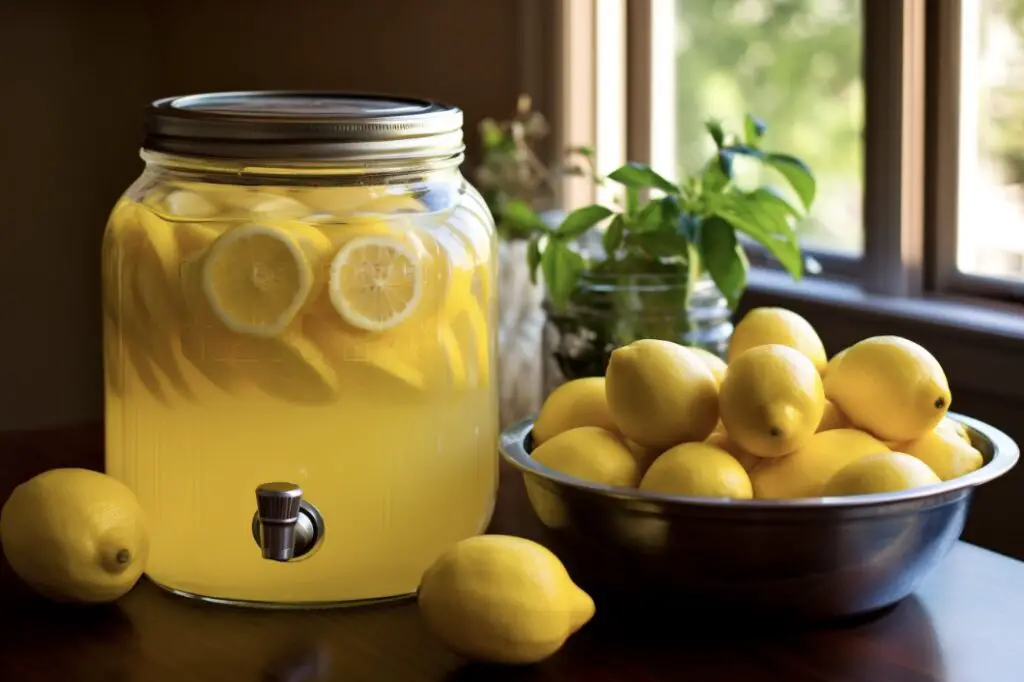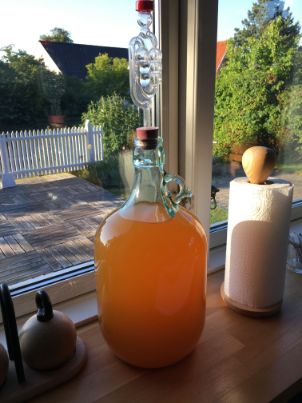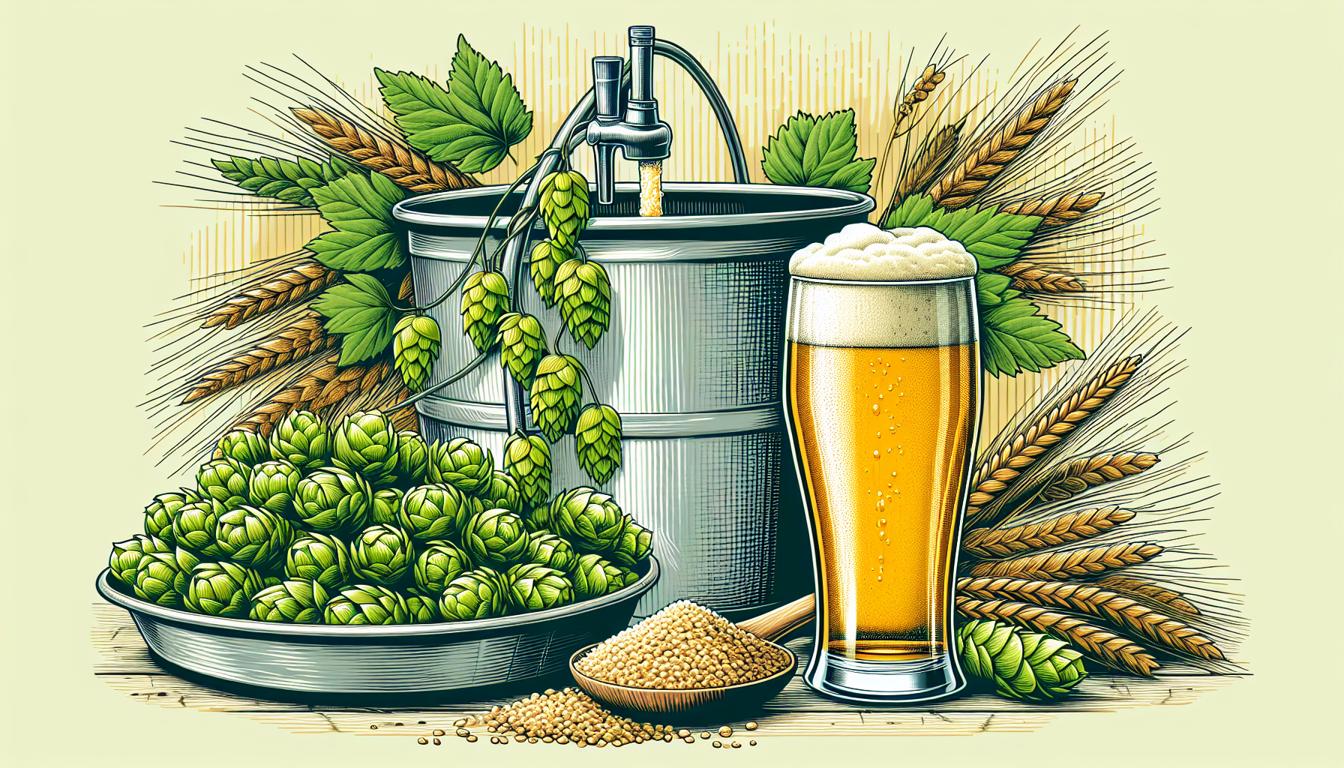Homebrewing is an art form that has grown in popularity over the years. As a brewer, I have had the opportunity to experiment with a wide variety of ingredients and methods, from traditional beers and wines to more unique and exotic concoctions.
One question that crossed my mind as a young lad, as well as the minds of many fellow brewers, is whether lemon juice (or lemonade!) can be fermented.
To answer the main question, yes, you can indeed ferment lemon juice! However, it requires some adjustments such as sugar, water and other additions (essentially making lemonade), as well as careful monitoring, to produce a successful final product.
Some people will refer to fermented lemonade as “Skeeter Pee”, and I have included a recipe for this iconic drink here as well.
The Science Behind Fermentation
Before diving into the specifics of fermenting lemon juice, it is essential to understand the science behind the fermentation process.
At its core, fermentation is the conversion of sugars into alcohol and carbon dioxide by yeast. This occurs naturally in many fruits and vegetables, and humans have been harnessing this process for thousands of years to create alcoholic beverages.

The primary factor that influences the success of fermentation is the sugar content of the substance being fermented. Yeast requires sugar to survive and produce alcohol, so a higher sugar content typically results in a higher alcohol content in the final product.
Additionally, the acidity of the substance can impact the fermentation process, as yeast prefers a slightly acidic environment.
The Challenge of Fermenting Lemon Juice
The main challenge in fermenting lemon juice lies in its high acidity and low sugar content. Lemons have a pH of around 2, making them one of the most acidic fruits available.
This acidity can inhibit the growth of yeast and slow down the fermentation process. Additionally, the sugar content of lemon juice is relatively low compared to other fruits, which can also hinder the fermentation process.
As a result, fermenting lemon juice requires some adjustments to the process to ensure the success of the final product.
Balancing the Acidity
Another important aspect of fermenting lemon juice is balancing its acidity.
To create a more hospitable environment for the yeast, we can dilute the lemon juice with water or add a buffering agent, such as calcium carbonate, to raise the pH.

To overcome the acidity of pure lemon juice, that will not ferment easily, we usually just add water to dilute the citric acid from the lemons enough for the yeast to take hold.
This will help ensure the yeast’s survival and promote a more successful fermentation process. It will also make it taste much better…
When I experimented with fermenting lemon juice, I found that diluting the juice with an equal part of water helped create a more favorable environment for the yeast without compromising the lemon flavor.
To test the lemon juice and throughout the process, it is important to measure the pH so that you know how much you have to dilute your juice.
Nowadays, this is most easily done by a good cheap electric pH meter, and I have tested quite a few throughout the years and written about my favorite pH meters here.
Increasing the Sugar Content
To ferment lemon juice successfully, the sugar content must be increased to provide the yeast with a sufficient food source.
This is why we add sugar to the lemon juice – to feed the yeast!
This can be done in several ways, such as adding sugar, honey, or other sweeteners to the lemon juice. The amount of sugar added will depend on your desired alcohol content and the specific yeast strain you are using.
In my personal experience, I have found that adding a 1:1 ratio of sugar to lemon juice works well for achieving a balanced and palatable final product. This can be adjusted based on your personal preferences and the specific yeast strain you are using, so experimentation is key.
Skeeter Pee (Fermented Lemonade) Recipe
Skeeter Pee is a popular homemade alcoholic beverage, often described as a lemon wine or lemonade wine. It’s a refreshing and zesty drink with a mild sweetness and a pleasant citrus tang.
The name “Skeeter Pee” is believed to have originated from the idea that the high alcohol content could keep mosquitoes (skeeters) away during outdoor gatherings.

This beverage has gained a loyal following among homebrewers due to its ease of preparation and delicious taste, making it an excellent choice for summer parties and gatherings.
It is inexpensive, quick, and easy to make and drink. Here is a recipe for a 5-gallon batch of Skeeter Pee:
Ingredients:
- 3 bottles of 32 oz 100% lemon juice (e.g. ReaLemon in the green plastic bottles or equivalent)
- 7 lbs sugar (or 16 cups) to ferment
- 3/4 tsp tannin
- 6 tsp yeast nutrient (3 now, 3 later)
- 2 tsp yeast energizer (1 now, 1 later)
- Approximately 4 1/2 gallons water
- Yeast Slurry
- Potassium metabisulfite (Kmeta)
- Potassium sorbate (sorbate)
- Sparkolloid
- 2 1/3 lbs sugar (or 6 cups) to sweeten finished Skeeter Pee. Use more or less for your tastes.
Instructions:
- Make invert sugar by adding your sugar to a large stainless cooking pot along with water and lemon juice. Stir sugar to dissolve and heat to just below boiling while stirring. Hold at this temperature for about 30 minutes.
- Allow to cool slightly and pour it into your primary along with the lemon juice and enough additional water to make 5 1/2 gallons.
- Add the tannin, yeast nutrient, and yeast energizer. Stir.
- Test S.G with hydrometer and record. Aim for an SG of around 1.070 which yields a beverage of around 10% alcohol if it ferments dry.
- Vigorously beat the mixture with a wire whip for a couple of minutes to introduce oxygen and purge it of artificial preservatives.
- Cover the bucket with a dish towel and let it sit for 24 to 48 hours.
- After 24-48 hours, give it another quick whip and then pour in yeast slurry from the first rack of another batch of wine.
- It sometimes takes a while, but you should have active fermentation within a couple of days.
Enjoy your homemade Skeeter Pee! Is there anything else you would like to know?
Choosing the Right Yeast
Selecting an appropriate yeast strain is crucial for the success of fermenting lemon juice. Some yeast strains are more tolerant of acidic environments, making them better suited for this process.
In my experience, champagne yeast (Saccharomyces bayanus) has proven to be a reliable choice for fermenting lemon juice, as it is both acid-tolerant and capable of producing a high alcohol content.
Monitoring the Fermentation Process
As with any fermentation, it is essential to closely monitor the process when fermenting lemon juice.
This includes regularly checking the specific gravity of the mixture using a hydrometer to track the progress of the fermentation and ensure it is complete before bottling.

Additionally, due to the high acidity of lemon juice, it is crucial to monitor the pH levels throughout the process. This can be done using pH test strips or a digital pH meter. If the pH becomes too low, additional buffering agents may need to be added to maintain a healthy environment for the yeast.
Aging and Flavor Development
Once the fermentation process is complete, the resulting alcoholic lemon juice – often called “skeeter pee” or “hard lemonade” – can be aged to develop its flavors further. This can be done in a variety of ways, such as oak aging, which can add depth and complexity to the final product.
In my experience, aging the fermented lemon juice for at least a month allows the flavors to meld and develop, resulting in a more enjoyable and well-rounded beverage.
Creative Variations
One of the joys of homebrewing is the ability to experiment with different flavors and ingredients. Once you have mastered the basics of fermenting lemon juice, you can try adding various fruits, spices, or herbs to create unique and personalized beverages.
Some of my favorite variations include adding fresh ginger or basil during the fermentation process, which adds a refreshing twist to the final product.
The Importance of Sanitation
As with any homebrewing endeavor, maintaining a clean and sanitized workspace is crucial for the success of your fermented lemon juice. This includes thoroughly cleaning and sanitizing all equipment and surfaces to prevent contamination, which can lead to off-flavors or spoilage.
Conclusion
In conclusion, while fermenting lemon juice can be a challenge due to its high acidity and low sugar content, it is certainly possible with the right adjustments and careful monitoring. The resulting beverage, often called “skeeter pee” or “hard lemonade,” can be a refreshing and enjoyable addition to your homebrewing repertoire.
To recap, here are ten essential facts about fermenting lemon juice:
1. Yes, lemon juice can be fermented, but it requires adjustments to the process.
2. The high acidity and low sugar content of lemon juice pose challenges for fermentation.
3. Adding sugar to lemon juice provides yeast with a necessary food source.
4. Diluting lemon juice or adding buffering agents can help balance its acidity.
5. Champagne yeast is a reliable choice for fermenting lemon juice due to its acid tolerance.
6. Monitoring the fermentation process, including specific gravity and pH levels, is crucial.
7. Aging the fermented lemon juice can help develop its flavors further.
8. Experimenting with additional ingredients, such as fruits or herbs, can create unique variations.
9. Maintaining a clean and sanitized workspace is essential for successful fermentation.
10. The resulting alcoholic lemon juice can be a refreshing and enjoyable homebrewed beverage.
FAQs
Can fruit juice ferment?
Yes, fruit juice can ferment. Fermentation is a natural process that occurs when yeast or bacteria consume the sugars in the fruit juice and convert them into alcohol and carbon dioxide. This is how alcoholic beverages like wine and beer are made. However, not all fruit juices are suitable for fermentation as some may contain preservatives that inhibit the growth of yeast and bacteria.
Does citrus juice ferment?
Yes, citrus juice can ferment due to the presence of natural sugars and yeast. The fermentation process can produce alcohol and carbon dioxide, which can give the juice a fizzy or tangy taste. However, if left for too long, the juice can turn sour and spoil.
How long does orange juice ferment?
Orange juice can start to ferment within a few hours to a day if left at room temperature. However, the exact time of fermentation can vary depending on factors such as the temperature, sugar content, and presence of yeast or bacteria. It is recommended to consume orange juice within a few days of opening and to store it in the refrigerator to slow down the fermentation process.
Can lemon juice ferment?
Yes, lemon juice can ferment due to the presence of natural bacteria and yeasts. This can result in the production of alcohol and/or acetic acid, which can give the lemon juice a tangy or sour taste.
Is it OK to drink fermented orange juice?
It is not recommended to drink fermented orange juice as it can be harmful to your health. Fermentation can lead to the growth of harmful bacteria and mold, which can cause food poisoning and other health issues. It is best to discard any fermented orange juice and consume fresh orange juice instead.
Can lemons be fermented into alcohol?
Yes, lemons can be fermented into alcohol. However, the amount of sugar in lemons is relatively low, so it is not a common source for alcohol production. Most commercial alcohol is made from grains or fruits with higher sugar content.




